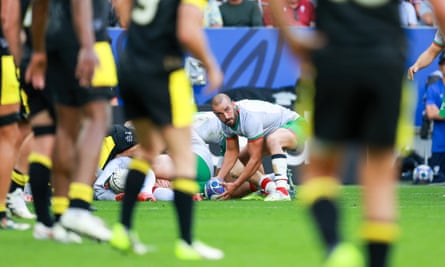Nearly two weeks into the World Cup and the big four are looking ominous. The opening fixtures were full of potential upsets but France, New Zealand, South Africa and Ireland have all set their stalls out. The All Blacks might have lost on the opening night but they have shown enough to demonstrate they will be competitive. France have got their wobble out of their system against Uruguay, and Ireland and South Africa have been mightily impressive. It’s hard to see a winner coming from anywhere else at this stage.
I think it’s the nature of World Cups. We’ve seen tier‑two nations, who have to find a way to score points against superior teams, play with more ball movement and attacking flair but the teams at the top end of the game, those well equipped for finals footie, squeeze, strangle and suffocate. They squeeze through their set-piece play, strangle through their kicking game and suffocate with their defence. Those three attributes tend to go a long way towards winning a World Cup.
France kicked 44 times against New Zealand and I love how that goes unnoticed. The big teams kick a lot but it’s more how they kick, when they kick and the accuracy with which they do it. Very rarely is it aimless, unless they’re under pressure, it’s all about playing in the right areas, limiting the amount of phases in parts of the field where they’re susceptible to turnovers because the breakdown is so fiercely contested.
We’ve also seen that when teams make a lot of changes to their lineups it’s easier if you have a really simple gameplan. So for teams such as England and South Africa it’s easier for guys to come in and execute that. For Ireland, France – who do kick but also play an intricate attacking game – and New Zealand, if you do make a lot of changes that cohesion element is really important.
We definitely saw French rustiness between the combinations they had selected against Uruguay. Ireland were a little bit like that and then they grew into the game against Tonga and the machine kicked in. New Zealand also started off a bit rusty but they didn’t change too many – Ardie Savea, Beauden Barrett, Sam Whitelock and Brodie Retallick were all there. For South Africa it’s an easier gameplan to adhere to – there’s no massive intricacy to defence, it’s all based on power.
The conditions are also having an impact on how matches are panning out. We saw Tonga’s Vaea Fifita go to change what hand in which he was carrying the ball and it flew out like he was holding a bar of soap. On television you can be looking at it thinking the conditions look brilliant but you can see these guys are drenched in sweat and the physios are running on with the sticky spray for the players’ hands to give that little bit of friction so the ball sticks a bit more when you go into contact.
It does make it harder to play with the ball in hand and sometimes the best thing to do is be really comfortable without the ball, especially in the middle of the field and then squeeze when you do get into attacking areas. It is a factor and the teams that can operate more comfortably under those conditions will have an advantage. It would be interesting to know how teams are preparing for it, whether they’re using wet balls. Often at Harlequins we’ll have buckets of soapy water to make it harder to hold on to the ball in contact.

The performances of Uruguay and Portugal have also shown the development of the tier‑two nations. Romania have struggled but Uruguay and Portugal are benefiting from being exposed to competition. The improvements in coaching setups you see around the world now, the funding that has been given to those teams, it all makes a difference. The athletes are different now. I go back to 2007 and we put more than a hundred points on Portugal but the team I saw play the other day looked completely different. You’re seeing a better quality of athlete, better coaches, funding is playing a part in that and then some of those guys are playing in the Premiership, Top 14 or Japan.
after newsletter promotion
The other trend we’re seeing in the opening fixtures is how the television match officials are more recognisable than the coaches because we’re seeing so much of them in the TV pictures. What’s important to keep in mind is that the decisions that they’re making are the correct ones but it’s almost got to the same point in football with VAR – a try is scored and you’re almost waiting for the whistle to go. Do we celebrate now? How many tries have been chalked off? I’m not saying they are wrong decisions but often we’re waiting two or three minutes to get an outcome.
We knew the bunker would have an impact. The decisions for the most part are correct around try‑scoring, that’s easier – but around clean-outs and high tackles, the word that comes to mind is consistency. We’re seeing one team get a red card, one that’s not even checked, or one that doesn’t get upgraded from yellow.
Defences can take matters into their own hands, especially with the adjusting tackler. For the most part it’s the adjuster – the second tackler – because the first tackle will go low and then the second comes in and looks to target the ball. If the tackler is falling we start to see arms slipping up to shoulders or necks or heads. We’ve seen how it can hurt teams, New Zealand are going to really miss Ethan de Groot after his red card, and there’s no doubt it’s going to have an impact on the knockout stages.

